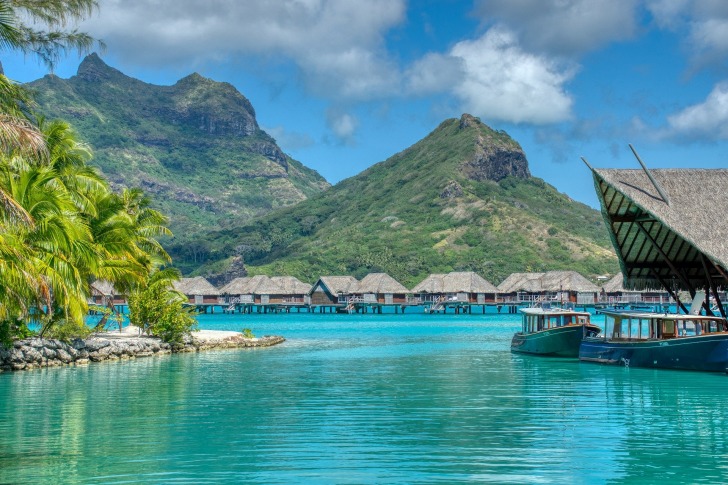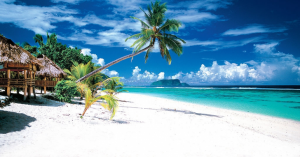Even though it is known as the Islands of Tahiti, Tahiti is one main island located in the South Pacific Ocean.
Tahiti is part of the Society Islands, also known as the Windward Islands or Iles du Vent in French Polynesian.
This island is the largest of several islands, including Moorea and Bora Bora.
Tahiti is renowned for being a tourist destination thanks to the location in the tropical paradise covering 403 square miles.
When visiting Tahiti as a traveler, you will find nature to be abundant.
The coral reefs and blue lagoons surround an island dotted with mountains and fertile coasts.
Many crops come from Tahiti, including hibiscus flowers, tropical fruits, and coconut palms, according to Britannica.
Additionally, two-thirds of the people who reside in the French Polynesian islands live in Tahiti.
This is where safety becomes an issue.
Warnings & Dangers in Tahiti

OVERALL RISK: MEDIUM
Currently, the US does not permit anyone to travel to Tahiti unless they present a negative PCR test result and are fully vaccinated to protect against COVID-19. Booster shots may be required depending on your age, and stricter measures apply when traveling between French Polynesian islands. This alone provides enough data for the risk to be Medium.

TRANSPORT & TAXIS RISK: MEDIUM
Due to COVID-19, travelers must have a Health Pass to go from Tahiti to Moorea, which is the closest island and typically a popular tourist activity. According to Frommer, Tahiti uses old school le trucks for most public transit. These are brightly colored open-air flatbed trucks for hauling people to the beach. These are considerably more unsafe than a closed cab taxi, which is also populous on the island. These appear to be safer and more expensive.

PICKPOCKETS RISK: LOW
Violent crime has a low risk in French Polynesia, according to the Australian Government. There are instances of petty crime including theft, pickpockets, and assaults that are typical of the bar scene or partying. By avoiding or being more cautious when partying or drinking at a bar in Tahiti, you reduce the risk of getting pickpocketed.

NATURAL DISASTERS RISK: HIGH
Currently, the US Department of State and the Bureau of Consular Affairs have restricted all travel from the US to French Polynesia. This is a level 4 Do not travel advisory that has been in place since December 28, 2021. This is due to COVID-19 and health risks are present. There are four total levels of travel advisories ranging from level 1, Exercise normal precautions, to Level 4. COVID-19 is a natural disaster that resulted in human casualties, which puts this risk very high. Cyclones, tsunamis, earthquakes, and tropical storms are other natural disasters that are more likely to occur here.

MUGGING RISK: LOW
In the city of Papeete, you have more people, which equates to more crime and a greater risk of mugging in general. However, Tahiti and French Polynesia at large have a low rate of crime, including thefts and assaults.

TERRORISM RISK: LOW
The Australian Government and Consular Service Charter states in French Polynesia and Tahiti there are no larger than typical terrorist threats or cells. Travel protection should always be in place to protect oneself against terrorists. There are resources to help if you have encountered a terrorist while in Tahiti. For emergencies, contact the US Embassy in Suva, Fiji at 679-772-8049. There is also a US Consular Agent in French Polynesia for US citizens.

SCAMS RISK: LOW
One common scam that travelers encounter in Tahiti is timeshare cancellations, but this is risky for any location. If you travel to Tahiti only once and do not have financial ties to French Polynesia, you are less likely to be scammed. Since there is a low petty crime rate here, you have less of a reason to be concerned about scam risk as well.

WOMEN TRAVELERS RISK: HIGH
If you are traveling while pregnant, the Zika virus is in Tahiti and you should wait unless it is essential to travel. Since it is a conservative country, you may experience cold shoulders or stares when traveling solo as a woman. Wear conservative clothing, and stay at rest to avoid unwanted attention. If you use public transport, you may be subject to verbal harassment, groping, and even sexual assault if you fall asleep alone.

TAP WATER RISK: HIGH
You are at risk of developing a water-borne or food-borne disease in Tahiti. This includes parasites and infectious diseases, such as scabies and conjunctivitis. As a result, bottled water is recommended in rural areas, and you should avoid raw or uncooked foods, including salad greens. If you are in Papeete, the capital city of French Polynesia in Tahiti, then you are OK using ice cubes or tap water. However, the Australian Government recommends avoiding ice cubes, not drinking tap water, and only using boiled or bottled water while outside of Papeete.
Safest Places to Visit in Tahiti
Resorts and public beaches are the safest places to visit in Tahiti, as these are populated by a wide variety of individuals.
You have business owners, vendors, hotel clerks, and security staff at these locations.
Keep in mind, the rural and isolated beaches of Tahiti are not often patrolled by local authorities, so stay alert if you are traveling off-road here.
Shopping in malls and markets, especially in Papeete, are popular and safe for travelers.
After dark, the nightlife in Tahiti at dance clubs, restaurants, and bars heats up and is safe for most people.
Be cautious of petty crimes, such as pickpockets, as you would in any touristy locale.
Places to Avoid in Tahiti
Travelers typically go to three places when visiting Tahiti—the beaches, the jungles, and the cities.
All three are safe and established for tourism.
Take advantage of the ocean safely with sailing and yachting at ports along with scuba diving rental equipment.
The jungles and mountains have ziplining and hiking trails along Mt. Aorai and the volcanic peaks of the island.
However, you should use a tour guide or service to avoid traveling to these places alone.
Do not go to beaches that do not have a lifeguard or police-monitored protection.
As for the cities, when shopping, avoid spending large amounts of money or using cash.
Go digital and be discreet for your best protection, but be prepared if someone skims your card at a register and steals your information.
Large cities in any urban area are prone to identity theft and cybersecurity risks.
Safety Tips for Traveling to Tahiti
- Go in the on-season during the US winter months, which is popular for a reason.
- The rainy season is from November to April, and January is the wettest, even though it is in season for travelers. Pack for rainy weather just in case.
- When swimming, deep ocean currents contain sharks and should be avoided, as should the coral reefs that are protected and sharp.
- Register with the US Embassy and the Smart Traveler Enrollment Program (STEP) before you go to Tahiti. This allows you to receive US Embassy contacts and information regarding your travel plans, and a way to contact loved ones in case of an emergency.
- Tahiti used to be populated with the Arioi that were associated with three things—Marlon Brando, infanticide, and being sexually explicit. This, according to Frommer’s, was in the 1960s. Do these bands of high chiefs still exist? Most likely, so be advised.
- If you see a rash or become very sick, go to the local medical center for treatment. Infectious diseases and parasites are more common here than in the US.
- Prepare for a COVID-19 related lockdown and to spend an indefinite amount of time in Tahiti if this occurs.
- Bring face coverings that are suitable for protecting against COVID-19 while in Tahiti and expect to wear them at all times.
- Keep your personal belongings, including cyber information, safe at all times by being extra precautious in hotel rooms, at cafes, and in public spaces. Bring only the technology, i.e., laptops, cameras, smartphones, you need when on vacation.
- Avoid gatherings or demonstrations if you see civil unrest.
So... How Safe Is Tahiti Really?
Now is not a good time to go to Tahiti.
Quarantine is mandatory for almost anyone entering Tahiti.
The US Embassy does not advise it with a level 4 warning stating No to travel due to COVID-19.
This is a natural disaster and a health pandemic that is adversely affecting Tahitians and travelers to French Polynesia.
Traveling to Tahiti requires you to be fully vaccinated and to have medical insurance or a large bank account.
To travel between islands, you have to have a health safety card.
These are not typical reasons that these islands are not safe.
However, for Tahiti, this is exactly why it is not a safe time to travel to the island.
You are at risk of contracting a fatal disease called COVID-19, and there is a requirement to quarantine when you arrive in most instances.
This will reduce your time spent in Tahiti if you are even allowed to enter the country once you arrive via airplane or cruise ship.
Otherwise, besides this natural disaster, Tahiti has a low rate of serious crime or petty crime, and they appear to be mildly tolerant of other cultures, including the gay and lesbian community.
This gives Tahiti a low overall safety rating when it comes to times when there is not a pandemic.
Right now is simply one of those unique occurrences that cannot be avoided, and is preventing travelers from safely entering the Islands of Tahiti.
How Does Tahiti Compare?
| City | Safety Index |
|---|---|
| Tahiti | 65 |
| Bora Bora | 92 |
| Mo’orea | 78 |
| Sao Paulo (Brazil) | 45 |
| Rio de Janeiro (Brazil) | 43 |
| Sofia (Bulgaria) | 73 |
| Siem Reap (Cambodia) | 63 |
| Phnom Penh (Cambodia) | 61 |
| Niagara Falls (Canada) | 87 |
Useful Information

Visas
For US citizens who are traveling to Tahiti for a vacation or short stay of fewer than 90 days or three months, there is no requirement to have a tourist visa.

Currency
The currency in the Islands of Tahiti and French Polynesia uses the French Pacific Franc. This is called an XPF or CFP and the bills consist of ones, twos, fives, 10s, the 20s, and 50s. If you have French Pacific Franc money, these are on a fixed exchange rate with the Euro by the European Union due to the French connection. You can spend both US dollars and European euros in Tahiti, but there are also exchange banks in the cities.

Weather
The warmest month of the year for Tahitians is January, and the coolest month is July. This is the opposite of the US due to its location in the Southern Hemisphere. Temperatures reach 30 degrees C (86 degrees F) and drop to 28 degrees C (82.4 degrees F) for the highs year-round. The lows dip to between 20 degrees C (68 degrees F) to 23 degrees C (73.4 degrees F) year-round. It’s nothing but sunshine here most days out of the year.

Airports
To get to Tahiti by plane, fly into Faa’a International Airport near Papeete, which is the capital city of French Polynesia. There are also local airports for traveling between islands.

Travel Insurance
Travel insurance is now a semi-requirement for visitors to Tahiti. This is to cover any COVID-19 related medical expenses that might arise when you are there due to the high risk of infection. There is the ability to pay your way out of this one. If you do not have insurance, you have to provide enough money to pay for any associated costs related to COVID-19.
Tahiti Weather Averages (Temperatures)
Average High/Low Temperature
| Temperature / Month | Jan | Feb | Mar | Apr | May | Jun | Jul | Aug | Sep | Oct | Nov | Dec |
|---|---|---|---|---|---|---|---|---|---|---|---|---|
| High °C | 28 | 28 | 29 | 28 | 28 | 27 | 26 | 26 | 26 | 27 | 27 | 28 |
| Low °C | 21 | 21 | 22 | 21 | 20 | 19 | 19 | 18 | 19 | 20 | 21 | 21 |
| High °F | 82 | 82 | 84 | 82 | 82 | 81 | 79 | 79 | 79 | 81 | 81 | 82 |
| Low °F | 70 | 70 | 72 | 70 | 68 | 66 | 66 | 64 | 66 | 68 | 70 | 70 |
French Polynesia - Safety by City
| City | Safety Index |
|---|---|
| Bora Bora | 92 |
| Mo’orea | 78 |
| Tahiti | 65 |












For tourists this is great
The Island of Tahiti is a beautiful place but some of the people are not that friendly especially towards women traveling alone. If I was a woman I would not come here alone. People look at you with a strange look and there are those that can verbally attack you for who knows what. Other than this, you need to pay attention to thieves who target unlocked cars or unsupervised valuables (phones, purses). It doesn’t happen often to see thieves but it does happen so take care.
As for entertainment, there are plenty of things to do. I’ll outline a few of the ones I tried or heard good things about. One of them is the Snorkeling & Lunch Tour that lasts for 6 hour. One of the best ones on the island and you shouldn’t miss it if there are spots available as it often sells out quickly. Or there’s the Half Day Tour: Moorea Snorkeling & Sailing on a Catamaran named Taboo. It’s a great way to spend a day here.
Took the Moorea Twin ATV Tour which was a nice experience and I would do it again. Saw a lot of interesting things.
I visited the Maraa Grotto which is the largest around. Worth the trip.
I highly recommend you visit Paofai Gardens since its location is unmatched. It’s a harbor side park that has a lot of things to offer.
I know it’s not a main attraction or so to speak but I liked the Municipal Market. Plenty of fruits and veggies to choose from here and the people were friendly.
I also took a private island tour by Tahiti circle island tours which was very nice. Lasted somewhere around 5 hours and I learned a lot about the history of this place and saw a lot of it’s landmarks.
An interesting one is the Discover Papeete by Segway from MaevaRide. I didn’t try it but some friends who did said it was very fun.